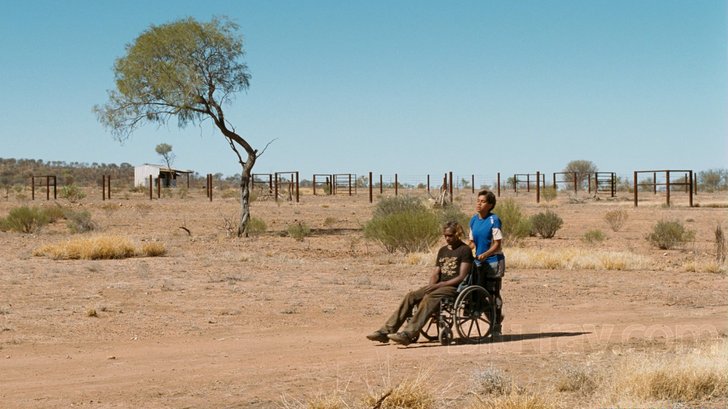Every now and then a film comes along that, for you, will never become irrelevant. The themes that it carries, the messages it sends, the honesty and compassion it expresses just align with what you feel and who you are.
For me, Samson and Delilah is one of those films. I’ve only seen it the one time, ten years after its release and it is now one of the most important films that I have ever seen.
The film revolves around two Aboriginal youths, following them from their tiny outback community to their travel to the closest regional hub and then back out bush. The trials in tribulations that the pair face on their travels are not uncommon and I have read about them myself, I have seen them myself and I have even been victim to them myself.
I have been followed around stores; I remember one occasion in K-Mart in which a young man followed me everywhere I went to the point I asked him if he needed a hand. He panicked and walked away silently. It’s an embarrassing feeling that messes with your self-esteem and ironically enough I was actually a department manager at the Coles next door at the time. I have experienced racism, at work – from customers and co-workers, at school, in social settings and more. Samson and Delilah brought all of that up for me. I connected to the film on so many levels.
The community in which Samson and Delilah reside is such a brutally honest place. It reminds me of spending time in Yalata with my father, a remote place. It had one tiny store. I met an older Aboriginal man, a friend of my father, he lived in an old caravan and it was nearly about ready to collapse. 30 degrees must have felt like 50 for him on a hot day. It also brought up a few years ago when the Tony Abbott and the government started to force the closure of Aboriginal communities. The same once they forced them onto decades earlier and then have the nerve to say it’s a “lifestyle choice” – I wonder if Abbott would say the same thing to farmers affected by drought.
In the film, Delilah is taken from the street – kidnapped – most likely sexually abused and beaten. It reminds me of Tiahleigh Palmer, who was sexually abused by her foster brother and killed by her foster father. Her foster father, Rick Thorburn, was a man with a criminal record that spanned across two decades and he was still allowed to become the foster carer of Tiahleigh, a 14 year old Aboriginal girl. The film brings to mind the killing of Kwementyaye Ryder in Alice Springs. In this incident, a car load of five young white males drove around an area were Aboriginal people were camped, they drove right up to them, nearly hitting them. When Kwementyaye threw a bottle at the car that was driving straight at him at a high speed, the car stopped, the men jumped out of the car and beat him to death.
Delilah is also hit by a car in the film and while the circumstances are not the same it brings back memories of hearing about the death of young Elijah Doughty after he was run over by a land cruiser and killed. The driver of the vehicle was purposefully chasing Elijah because he thought he was riding his stolen motorcycle, instead of letting the police do their jobs, the man took the law into his own hands. The incident resulted in a riot in the main street of Kalgoorlie. This issue struck home for me because my mob are from that area. I lived there when I was 18 to work with my father whom had returned to country and still have two brothers among other family still living there.
Samson and Delilah have barely any dialogue in the film. Director Warwick Thornton said during the Q and A that this was intentional. Because we as Aboriginal people don’t have a voice. This action by Warwick Thornton could not be more relevant as it is today. The Uluru Statement from the Heart called for a First Nation Voice to be established in the constitution as well as a Makarrata Commission to supervise a process of agreement making and truth telling between the government and Aboriginal and Torres Strait Islander people. This request has been completely ignored and instead we have been handed a “special envoy for Indigenous affairs” in the form of Tony Abbott – of all people. Another example is the absence of Aboriginal and Torres Strait Islander voices on TV – in particular breakfast television, and to be even more specific – Sunrise. The Channel 7 morning breakfast show that ignored facts and reality to tell blatant lies about Indigenous children and the processes regarding them when being taken from family.
There are more examples in the film such as the extortion of Aboriginal art work and the lack of services available in the community and homelessness. These themes and issues are still as big of a problem in 2018 as they were back in 2008 when the film was released. It was relevant in 1998, 1988, 1978 and will be relevant in 2028 – such is the political climate in Australia. The themes in the film, and the film itself are sadly timeless.
During the screening I heard gasps and crying and I just wonder if the people that the film upset so much realise how brutally honest the film is. The film truly is heart breaking, I went in thinking it was purely a love story, but I was so wrong. While yes, it is a love story it is also a story of struggle, commitment and survival.
The relationship that slowly develops between Samson, played by Rowan McNamara and Delilah, played by Marissa Gibson blossoms perfectly. They are just two kids who learn the be there for each other, but there not perfect. Their performances are though. They are both amazing in their roles. As is Scott Thornton as Gonzo, a homeless Aboriginal man that they befriend for a short time.
Writer, Director and Cinematographer Warwick Thornton has done a truly amazing job with this film. He has really put a lot of thought into it and produced a perfectly structured social commentary that is going to reflect Aboriginal lives for a long time to come.
Director: WarwickThornton
Cast: Rowan McNamara, MarissaGibson, Scott Thornton
Writer: Warwick Thornton



